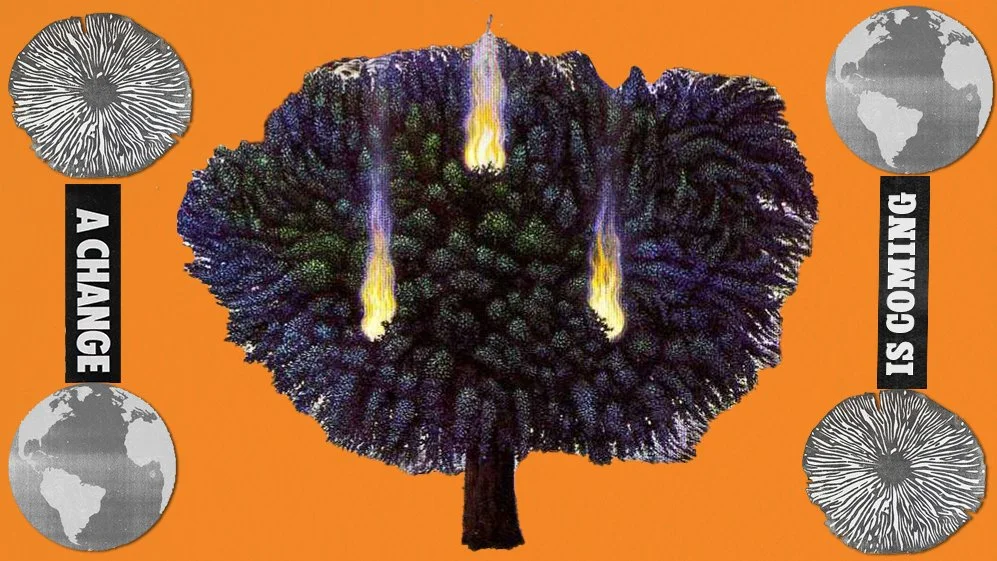
How magic mushrooms can motivate action and reduce anxiety in the age of climate change
What draws people to psilocybin? A lot of us would say it’s the way it quiets your ego and tunes you into the natural world. It roots you in the present moment. It anchors you in the immediate world so the numerous problems of being a modern human can fall away, even just for a few hours. In many ways it dials us back to a more fundamental state of being.
This is probably why the past few years have seen psilocybin mushrooms explode in popularity. Part of this glow up comes from the hard work of activists to unravel stigmas and pull back restrictive legislation, thus making magic mushrooms and other psychedelics more accessible.
But it also seems that psilocybin’s signature effects, that weakened ego and stronger connection with nature, are vital qualities that we need more today than ever. In fact, it’s the lack of a strong bond with nature that’s fuelling many of our most pressing issues.
Every day we hear about new disasters driven by climate change—floods and fires, superstorms, famines, and droughts—and receive grimmer and grimmer warnings about our planet’s future. Humanity and nature have never been so at odds. Our entire way of life is premised on exploiting the planet. The more “advanced” we grow, the more disconnected we feel from nature.
But mushrooms seem to be specifically designed to restore that relationship.
So at this pivotal moment, when humanity’s relationship with the planet approaches a breaking point, could shrooms serve as a tool in the climate movement? How might it both catalyze the need for urgent and sweeping change and ease the anxiety and grief brought on by existential threats?
Psilocybin as mental health treatment
Research into psilocybin treatments for mental health already shows promise. Clinical trials, like this one from the Beckley Foundation, demonstrate that guided experiences with psilocybin, LSD, and MDMA can effectively address depression and anxiety, even in entrenched cases resistant to more traditional treatments. They can also serve as a palliative measure for terminal patients nearing the end of life.
The Beckley Foundation study, which was conducted by trained therapists, found that psilocybin can “reset the activity of key brain circuits known to play a role in depression.” On top of that, by making patients more accepting and reflective of their emotions, even negative ones, psilocybin treatment empowers emotional confrontations in a way that is ultimately beneficial.
Climate change and mental health
Climate change is now recognized a considerable and growing factor in mental illness worldwide, both via the immediate and traumatic effects of those who experience specific climate disasters firsthand, as well as those whose mental health is eroded by the looming threat of global environmental cataclysms. Concepts like “ecological grief” and “eco-anxiety” have entered the zeitgeist. A new term has even been invented to describe the longing for a traditional or remembered way of life destroyed by climate events: solastalgia.
In light of all this, it seems that psychedelics, which can both treat mental illness and foster a deeper connectedness with the natural world, are a perfect tool to fight climate anxiety.
Psychedelics and the climate movement
When it comes to climate activism, the math is simple: the more connected a person feels to nature, the more they care about climate change.
And what’s one of the main effects of psilocybin? Increased feelings of connectedness. Particularly, it turns out, connectedness with nature.
As University of Brighton psychologist Matthew Adams has written, “‘nature-connectedness’ is now considered a research topic in its own right in the field of psychology, an individual quality that can be measured: the extent to which they report feeling connected to and part of the natural world.”
The history of modern psychedelics and climate activism are inseparable. Albert Hoffman, the scientist who created LSD, was an ardent naturalist, even before stumbling across acid in his lab. Gail Bradbrook credits experiences with ayahuasca, kambo, and iboga with her co-founding Extinction Rebellion in 2018. Love of nature was a central pillar of the psychedelic-fuelled 1960s Counterculture.
A tool for change
When it comes to climate change, the overwhelming effects of grief and fear can be just as harmful as outright denial. These powerful negative feelings breed their own apathy: in the face of such a monumental challenge, what can we possibly do? Why bother? Psychedelics directly target this despair, simultaneously strengthening your connection to nature while reducing anxiety and fear.
The reality, of course, is that the behavioural changes of individuals can only achieve so much. What’s truly needed to even begin mitigating climate disaster is fundamental systemic change. But systems are ultimately made up of people, and that kind of change can only happen when a critical mass of individuals care enough to enact it. Psychedelics like psilocybin mushrooms shouldn’t be overlooked as a tool that could help us get there. There’s something poetic in the idea that nature would provide something to remind us of how important we are to one another.

